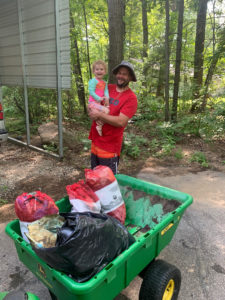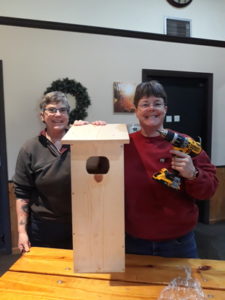Thank you from On the Water

The OTW program hosted volunteer events that brought together many kinds of outdoor enthusiasts. From consumptive users like waterfowl hunters and anglers to non-consumptive users like birders and photographers the OTW program helped them unite in the effort to improve and protect aquatic habitat.
Continuing with the theme of bringing people together the OTW program was able to host habitat improvement events with City Governments, Indigenous Communities, County Park Departments, University Research Departments, the Michigan Department of Natural Resources, Conservation Districts, and many active “Friends” groups. OTW was successful in creating these partnerships and they led to many productive habitat events. These partnerships often led to an increase of engagement in each of the respective communities as well as an increase in collaboration with fellow groups. For example in August of 2020 OTW hosted a Red Cedar River Cleanup in Williamston, Michigan with the Ingham County Conservation District. Twenty-seven volunteers came out to remove trash from the river and among the volunteers were representatives from the Lansing chapter of Trout Unlimited, Friends of the Red Cedar River, Middle Grand River Organization of Watersheds and student groups from Michigan State University.
 OTW currently has not received funding for the 2021 field season and will be concluding at the end of this month. OTW coordinator Emma Nehan wants to thank all of the project partners who gave OTW a shot and took a chance on this newly forming MUCC program. We can’t express how much it means to MUCC, OTW wouldn’t have been successful if it wasn’t for the project partners that made the OTW events happen. These project partners were the ones with the knowledge about where in the watershed the trash and invasive species were and how to go about the proper techniques to make these events happen and to be successful.
OTW currently has not received funding for the 2021 field season and will be concluding at the end of this month. OTW coordinator Emma Nehan wants to thank all of the project partners who gave OTW a shot and took a chance on this newly forming MUCC program. We can’t express how much it means to MUCC, OTW wouldn’t have been successful if it wasn’t for the project partners that made the OTW events happen. These project partners were the ones with the knowledge about where in the watershed the trash and invasive species were and how to go about the proper techniques to make these events happen and to be successful.
Finally, this program wouldn’t have been successful without our lovely volunteers, the ones who woke up early on their days off and came out, picked up the trash, pull invasive species, and ultimately give back to their environment. These volunteers cared so much about their local watersheds and environments that they wanted to come out and make a difference. OTW volunteers always showed up with a smile on their face and a positive mental attitude to go with it. These volunteers are the ones who will carry on being environmental stewards in their communities clean watersheds are important to maintaining the vitality of the Great Lake state. Our volunteers and project partners have seen a need for a program just like this in Michigan and have contributed to making it the success that it has become. There is a need and a desire for a successful program like OTW to carry on in the state of Michigan.
The post Thank you from On the Water appeared first on Michigan United Conservation Clubs.
Recent Posts



